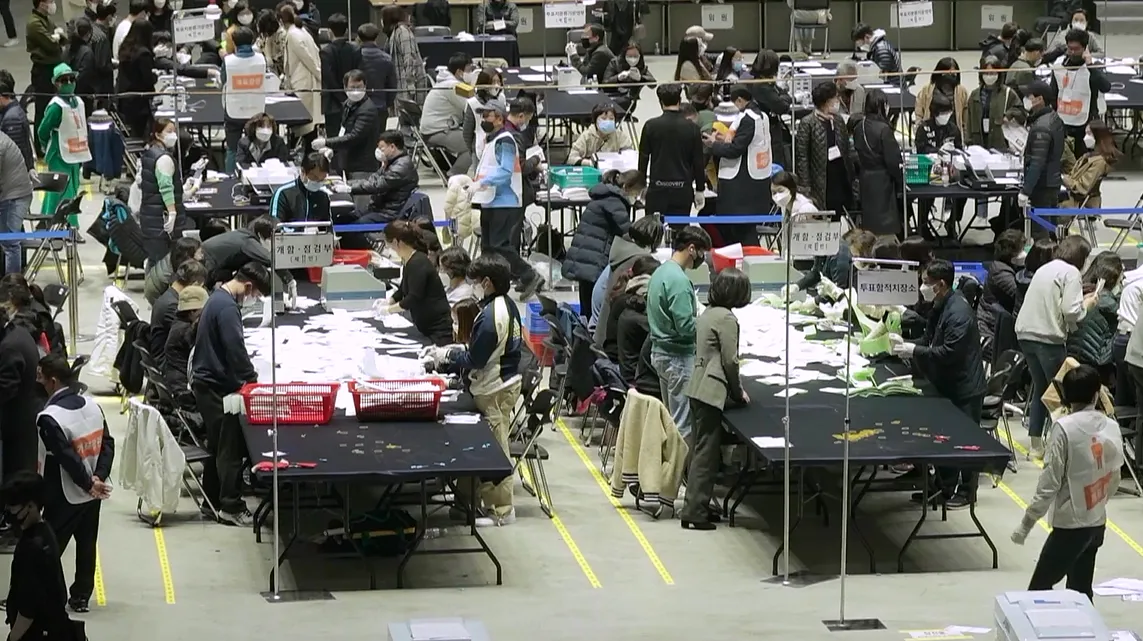Elections and Covid-19: How special voting arrangements were expanded in 2020

There is considerable variation in how citizens cast their ballot around the world during ‘normal times’. The traditional vision of an election is that citizens vote at polling stations using a paper ballot. However, modern technology has enabled voting at electronic kiosks and even remote internet voting. Elections have increasingly been made more convenient by allowing citizens to cast their vote ahead of election day, via the post or even by bringing the ballot box to the voter’s home. These have often been found to promote voter turnout.
Disclaimer: Views expressed in this commentary are those of the authors. This commentary is independent of specific national or political interests. Views expressed do not necessarily represent the institutional position of International IDEA, its Board of Advisers or its Council of Member States.
The Covid-19 pandemic opened a lively debate about the extension of these special voting arrangements (SVAs). Because citizens might be reluctant to travel and vote in person at polling stations for fear of catching the virus, voter turnout could decline. But while there was a pressing need to ensure safe voting methods that would provide confidence among voters, making late changes to legislation and operations caused havoc to election preparations.
So how did countries eventually respond? This article helps to address this question by presenting information on the SVAs that were introduced around the world in 2020 to help mitigate against Covid-19 transmission. Data was collected from electoral management bodies (EMBs), state institutions, media, and election observation reports from 52 national elections (in 51 countries) in 2020. This analysis forms part of a series that has covered other parts of the electoral cycle, including campaign limitations, health and safety in polling stations, and international election observation. It forms part of an ongoing study between International IDEA and the Electoral Integrity Project on Covid-19 and elections.
We found that many countries have adopted new SVAs or modified existing voting practices to reduce crowds and implement social distancing on election day, thereby reducing the risk of infection. Other reasons SVAs have been expanded include ensuring access for vulnerable groups and allowing people already with Covid-19 or in quarantine to vote.
SVAs can be defined as arrangements that allow voters to exercise their right to vote by alternative means other than casting a ballot in person at their respective polling station on election day. In total, 32 out of 51 countries (63 per cent) that have held national elections or referendums in 2020 made use of at least one SVA. Furthermore, 23 countries extended existing SVAs for people with Covid-19 or under quarantine (see Table 1). Five types of SVAs can be identified: early voting, postal voting, proxy voting, home and institutional-based voting by mobile ballot box, and Covid-19 arrangements in polling stations. A sixth; voting for overseas citizens, was also affected. We discuss each in turn.
Early Voting
Early voting, or advance voting, allows voters to cast their ballot before election day. The period for early voting varies per country and can be available for all voters or a specific category of voters. There are usually a limited number of polling stations that offer this option during the early voting period.
In total, 15 countries that held elections in 2020 used early voting arrangements, which were already available before the pandemic. Many countries expanded these early voting arrangements to reduce crowding on election day. For example, in South Korea, the EMB extended the period of voting to regulate voter flows. As a result, 26.7 per cent (11,742,677 ballots cast) of voters voted early compared to 12.2 per cent (5,131,721 ballots cast) in the 2016 Parliamentary election. Similarly, New Zealand, which also expanded early voting, saw an increase in early voting by 37.2 per cent (1,976,996 ballots cast) compared to the 2017 election (1,240,740 ballots cast) and by 63.7 per cent compared to the 2014 elections (717,579 ballots cast).
Some countries altered existing early voting arrangements for people in quarantine or infected by Covid-19. In Myanmar, voters who were unable to return to their place of residency because of restrictions could vote at temporary locations before election day. Early voting arrangements were made in North Macedonia to accommodate Covid-19 infected voters and those in self-isolation at their home. Applications could be made through an authorized representative in person or electronically, via email, or through an online application. In Bermuda, advance voting provision had already been made available to voters under the Bermuda Parliamentary Election Act 1978. However, this year it was also extended to voters with Covid-19. Similar provisions had been made in Trinidad and Tobago. Early voting was also facilitated by so-called drive-by voting (a method of voting whereby completed ballot papers are submitted into a ballot box at a drive-in polling station), made available for people with Covid-19 or self-isolating in Lithuania.
Postal Voting
Postal voting, correspondence voting, or vote by mail is an SVA where a ballot is delivered to the voter, usually to their place of residence. The completed ballot is usually returned by mail before a specific deadline, but the voter is allowed or required to return the ballot in person in some situations. Postal voting can be accessible to particular categories of voters or all.
In total, eight countries that held elections in 2020 made use of postal voting. Countries such as the USA and Poland expanded postal votes during the pandemic. In Poland, postal voting was made universal ahead of the 28 June Presidential election but did not see significant use (only 177,500 postal ballots were returned). However, postal voting in the USA saw a dramatic increase from just over 17 per cent in 2016, or around 23m votes, to over 41 per cent, or just under 36m, in 2020.
In all of these situations, postal voting required a prior application to be provided to citizens. Very few elections were all-postal, where everyone was sent a postal vote irrespective of whether they wished to vote through this medium. All-postal elections were held in regional elections in Bavaria during the pandemic and in some US states—but not nationally.
Proxy Voting
Proxy voting is a SVA where a voter authorizes another person to cast their vote for them. The reasons and requirements for the use of proxy voting vary per country. In total, four countries, namely Belize, Croatia, Poland and Switzerland, used proxy voting arrangements during national elections in 2020. In Croatia, proxy voting was made available for people with Covid-19 after a constitutional court decision.
Home and Institutional-based Voting by Mobile Ballot Box
Home and institutional-based voting is a SVA where a voter can cast the ballot from their home or current place of residence. This way of voting is designed for voters who cannot visit a polling station on election day for a variety of reasons. The manner by which a ballot is often cast is by mobile ballot boxes.
Home and institutional-based voting arrangements were widely used in twenty-one countries for homebound and people in quarantine or infected by Covid-19. Many countries, such as Croatia, Czech Republic, Lithuania, Moldova, Montenegro, Myanmar, North Macedonia, Romania and South Korea, extended existing provisions to accommodate those affected by Covid-19. For example, In Montenegro, the EMB granted hospitalized patients the right to vote through mobile ballot box teams. In general, requests could be made to authorities before a set deadline. Members of EMBs, that used protective equipment and were trained to follow protocols, visited voters. Physical distance was to be maintained, and voters were required to wear masks, remove them briefly during the identification process, and disinfect their hands before and after voting. For the referendum in Italy, people infected by Covid-19 and in isolation could vote from home if the request was made five days before election day to the authorities. The collection of the votes would take place under maximum health safety conditions. In Seychelles, the EMB set up five special polling stations for voters working in essential services, hospital patients, residents in elderly homes, and those in quarantine facilities and were open at designated days and times. In Singapore ahead of the July 2020 Parliamentary elections, mobile ballot teams brought ballot boxes to citizens isolating in hotel rooms who recently returned from overseas.
Covid-19 Related Arrangements in Polling Stations
Arrangements in polling stations can include arrangements for in-person voting on election day in and around polling premises as a result of concerns regarding public health or other emergencies.
In total, 11 countries implemented arrangements in polling stations for national elections. In Jamaica, Jordan, Sri Lanka, South Korea and Saint Vincent and the Grenadines, voters who got infected with Covid-19 or were in isolation or quarantine were able to cast their vote during specially designated times on election day. The voters needed to apply and receive permission from the authorities. Drive-thru/curbside voting was a new SVA made available for people with Covid-19 or self-isolating in the Czech Republic and Lithuania. In the Czech Republic, new legislation on drive-thu/curbside voting was passed two months ahead of the October regional and Senate elections. During the March 2020 legislative election in Israel, the EMB established 16 polling booths for 5,630 voters who were under precautionary home quarantine after returning home from abroad. Kuwait and the USA (Idaho) made similar arrangements by creating special polling stations on election day to avoid contact with other voters.
Covid-19 Impact on Arrangements in Polling Stations Abroad
Due to Covid-19 restrictions, many countries limited or even restricted Out-of-Country Voting (OCV) or voting from abroad, making this the only SVA that was reduced rather than expanded. South Korea's Electoral Commission (NEC) canceled the planned OCV arrangements, disenfranchising about 87,000 (51 per cent) potential voters living abroad as there was no opportunity to vote by mail. Similarly, mainly due to the pandemic, the Constitutional Court of Niger decided that there would be no OCV for the presidential election, even though the Electoral Code provides for OCV arrangements. Similar constraints were adopted in Guinea and the Central African Republic. The out-of-country registration process of North Macedonia did not reach the established threshold of voters, and OCV did therefore not take place.
Further, voters trying to cast their ballot abroad for the Moldovan elections ran into problems. At some polling stations abroad, Azerbaijan and France, for example, the polling stations' opening hours were shortened due to local Covid-19 restrictions. It was reported that people could not vote at the polling station in Frankfurt (Germany) due to the limited number of ballots sent. Moldovan citizens living in Frankfurt were urged to go to other polling stations in different cities.
Table 1. Special Voting Arrangements used in 2020 national elections and referendums by country
Type of SVA |
Country |
Early voting (15) |
Belarus, Bermuda*, Ghana, Iceland, Israel, Jamaica, Lithuania, Myanmar*, New Zealand, North Macedonia*, Russia, Sri Lanka, South Korea, Trinidad and Tobago*, USA |
Postal voting (8) |
Romania (only from abroad), Poland*, Lithuania, Iceland, New Zealand (only from abroad), South Korea*, Switzerland, USA, |
Proxy voting (4) |
Belize, Croatia*, Poland, Switzerland, |
Home and institutional-based voting by mobile ballot box (21) |
Belarus, Bermuda*, Croatia*, Czech Republic*, Georgia*, Iceland*, Italy*, Kyrgyzstan, Lithuania*, Moldova*, Montenegro*, Mongolia*, Myanmar*, North Macedonia*, Romania*, Russia, Singapore, South Korea*, Suriname*, Seychelles, Switzerland |
Covid-19 related arrangements in polling stations (11) |
Czech Republic*, Iceland*, Israel*, Jamaica*, Jordan, Kuwait*, Lithuania*, Saint Vincent and the Grenadines*, South Korea*, Sri Lanka*,USA (Idaho)* |
None of the above / No SVAs (19) |
Algeria, Bolivia, Burkina Faso, Burundi, Central African Republic, Chile, Côte d'Ivoire, Dominican Republic, Egypt Guinea, Iran, Liberia, Malawi, Mali, Niger, Serbia, Syria, Tanzania, Venezuela |
Source: Authors constructed using International IDEA, media reports, and EMB data using OSCE framework for Covid-19 related voting arrangements. Note: This table is based on 51 countries that held 52 direct national elections and referendums from 21 February until 31 December 2020. All of the countries included in the table had one or more confirmed cases of Covid-19 infection. Countries that include an asterisk extend SVA for Covid-19 patients. The table does not cover national by-elections or subnational elections.
Deliverability of changes
Although there is a need to adjust elections to the pandemic environment, there also needs to be consideration of the deliverability of any proposed changes. Poland provides a case study of where the late expansion of postal voting proved logistically difficult and the election had to be postponed as a result. Late changes can cause problems where administrators don’t have the prior experience of running elections through new methods, may not have the necessary infrastructure or there are difficulties in unpicking longstanding arrangements. For example, moving an election from one day to several days could require the booking of polling stations for longer—and such venues may not be available. If logistical problems occur in the delivery of elections, then trust can be undermined in both the process and outcome.
Late changes can also bring legal disputes. In Sri Lanka, several weeks before election day, the national election commission made a special decision to allow persons in quarantine centers and self-isolation to cast their ballots in advance of election day by way of a mobile voting arrangement. However, this decision was subsequently reversed following complaints from multiple political factions on grounds that the legislation requires voters to cast votes in-person at ordinary polling stations on election day. The principle of the electoral law stability should be observed when possible and this may come into conflict steps to make the elections covid-safe.
Even if new legislation can be adopted quickly in response to Covid-19, it may not possible to deliver the new SVA in time. For example, in Lithuania, the government adopted new legislation to provide for online voting three months ahead of the 2020 general elections. Nevertheless, the time needed to develop and test such a system was estimated to be around 18-24 months and therefore, it was decided that online voting would not be available for the 2020 election but for future elections.
Conclusion
The pandemic created an urgent need to consider whether the traditional methods of voting were fit for purpose. Many countries in Europe and Asia-Pacific quickly adapted their procedures through the expanded provision of SVAs. Adaptation of pre-existing SVAs was, therefore the predominant approach. In contrast, instances of countries adopting entirely new SVA procedures beyond Covid-19 related arrangements in polling stations were difficult to locate. This may be because making such dramatic changes close to polling day can be logistically and financially challenging and conflict with the principle of the stability of electoral law. Nonetheless, lessons on SVA from country experiences in 2020 will be significant both during the pandemic and beyond.





